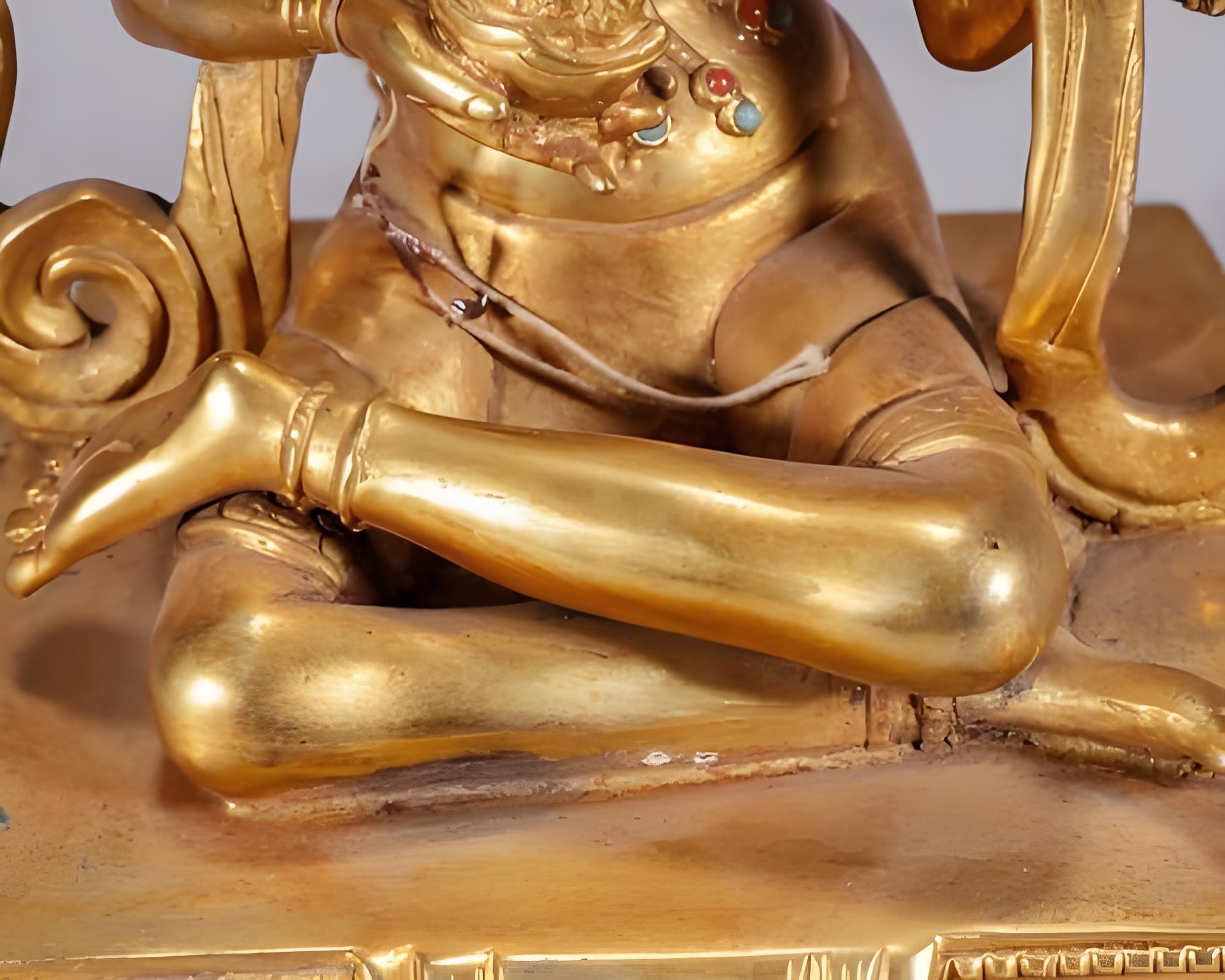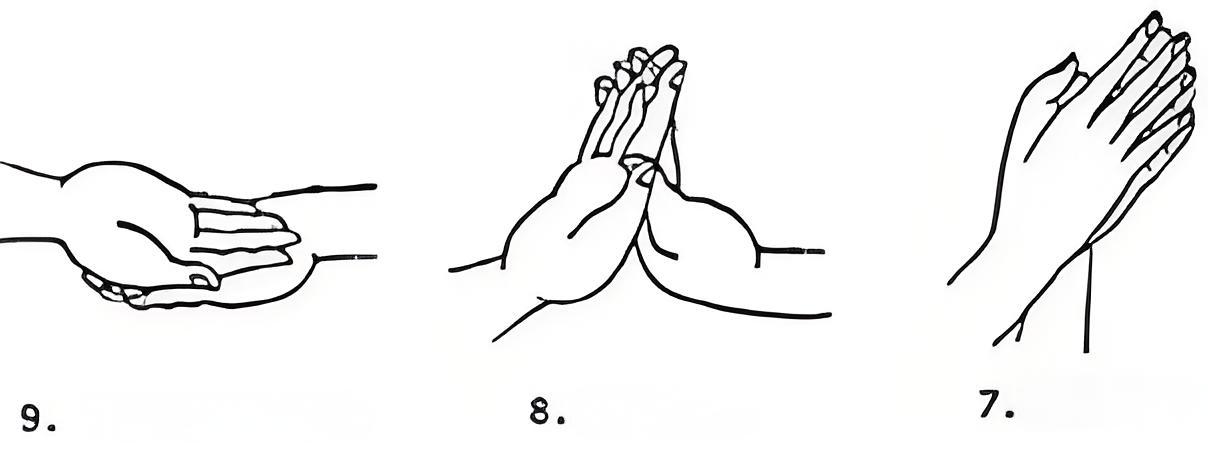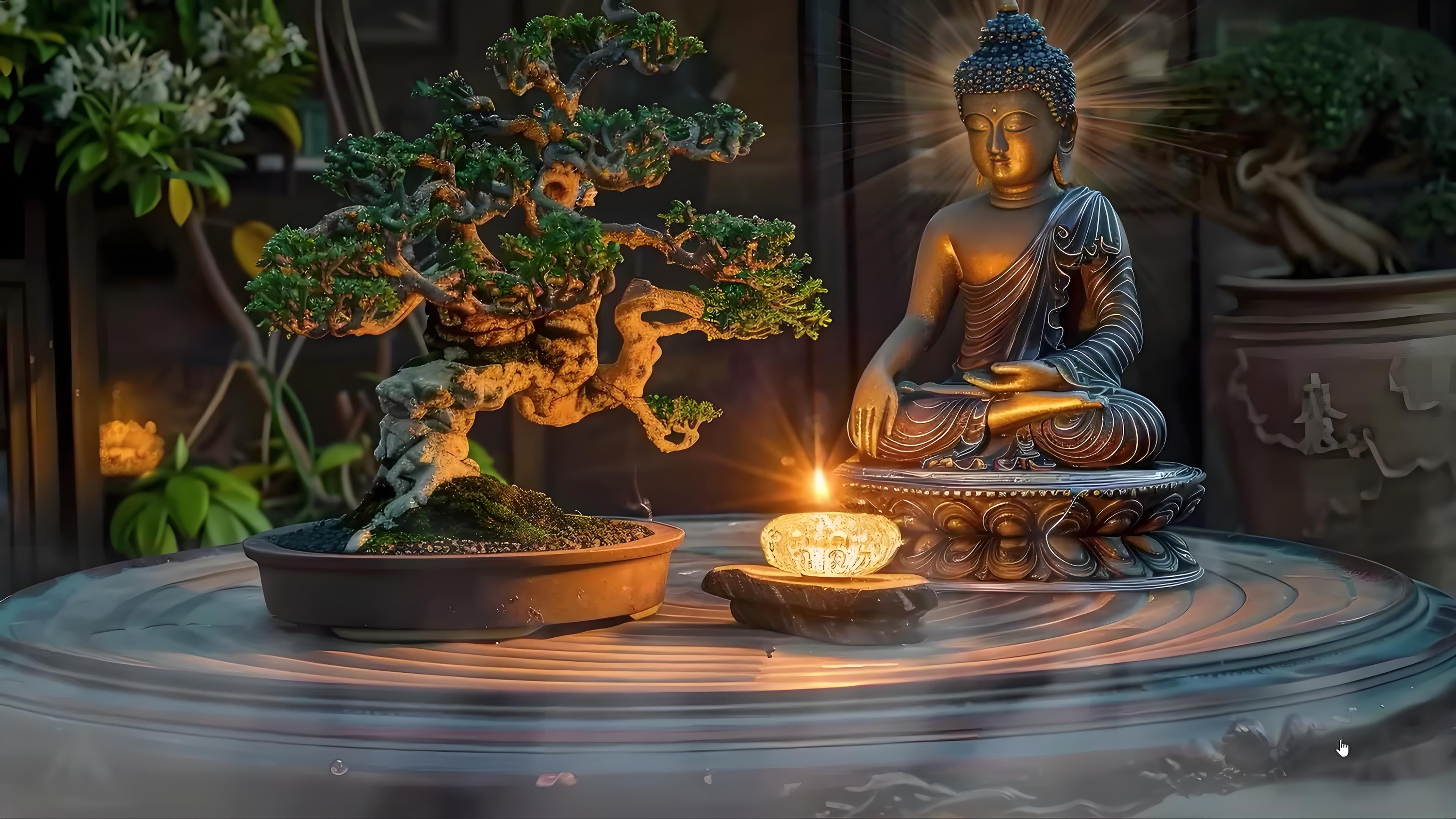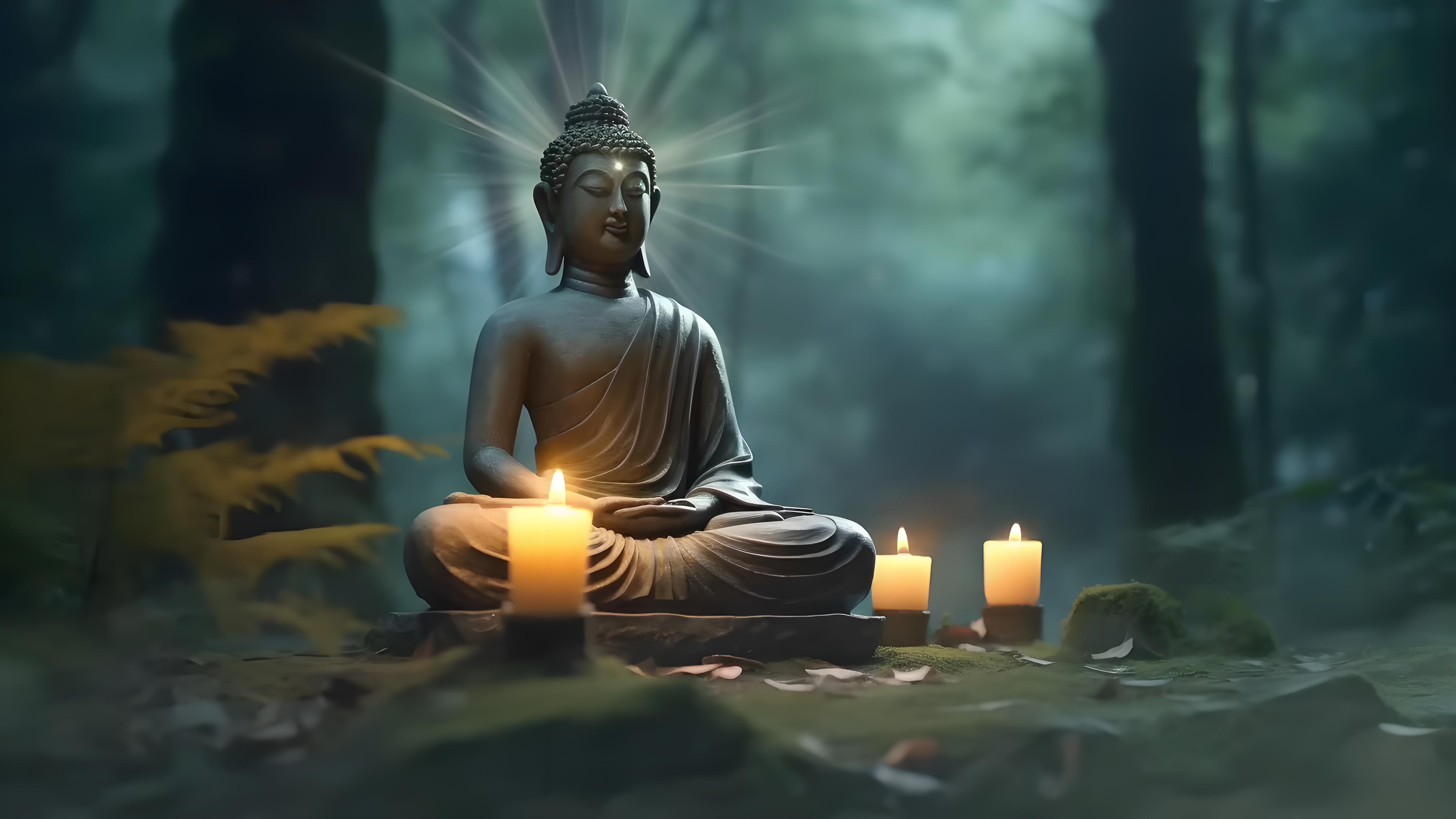type
status
date
slug
summary
tags
category
icon
password
AI summary
Dharma Protectors in Tibetan Buddhism
Worldly Dharma Protectors refer to deities with supernatural powers who are below the level of the Path of Seeing, such as Brahma and Indra.
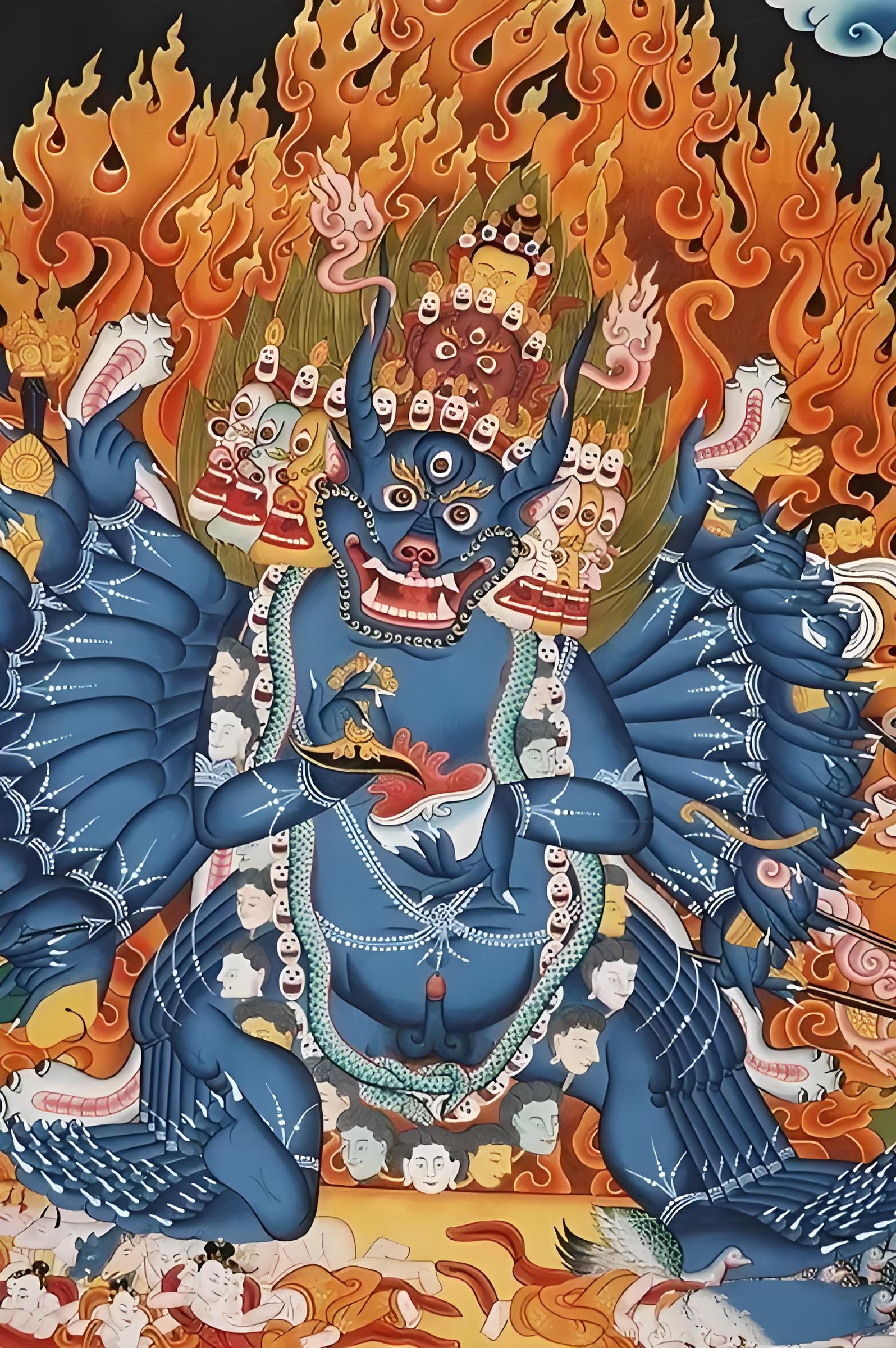
Transcendent Dharma Protectors refer to deities who are at or above the level of the Path of Seeing, such as the Ten Bhumi Bodhisattvas and the various deities manifested by Buddhas in the form of Dharma Protectors, such as Mahakala and Vaishravana. The teachings on transcendent Dharma Protectors are based on the Buddhist Tripitaka and the four tantras translated from India. This touches on the importance of the lineage of Dharma Protectors.
Worldly Dharma Protectors in Tibetan Buddhism are divided into three categories: understanding these types of Dharma Protectors is important for practicing Buddhism in the Tibetan tradition.
The first category originates from the exoteric and esoteric scriptures translated from Sanskrit in India. These are foundational texts for Buddhist practice.
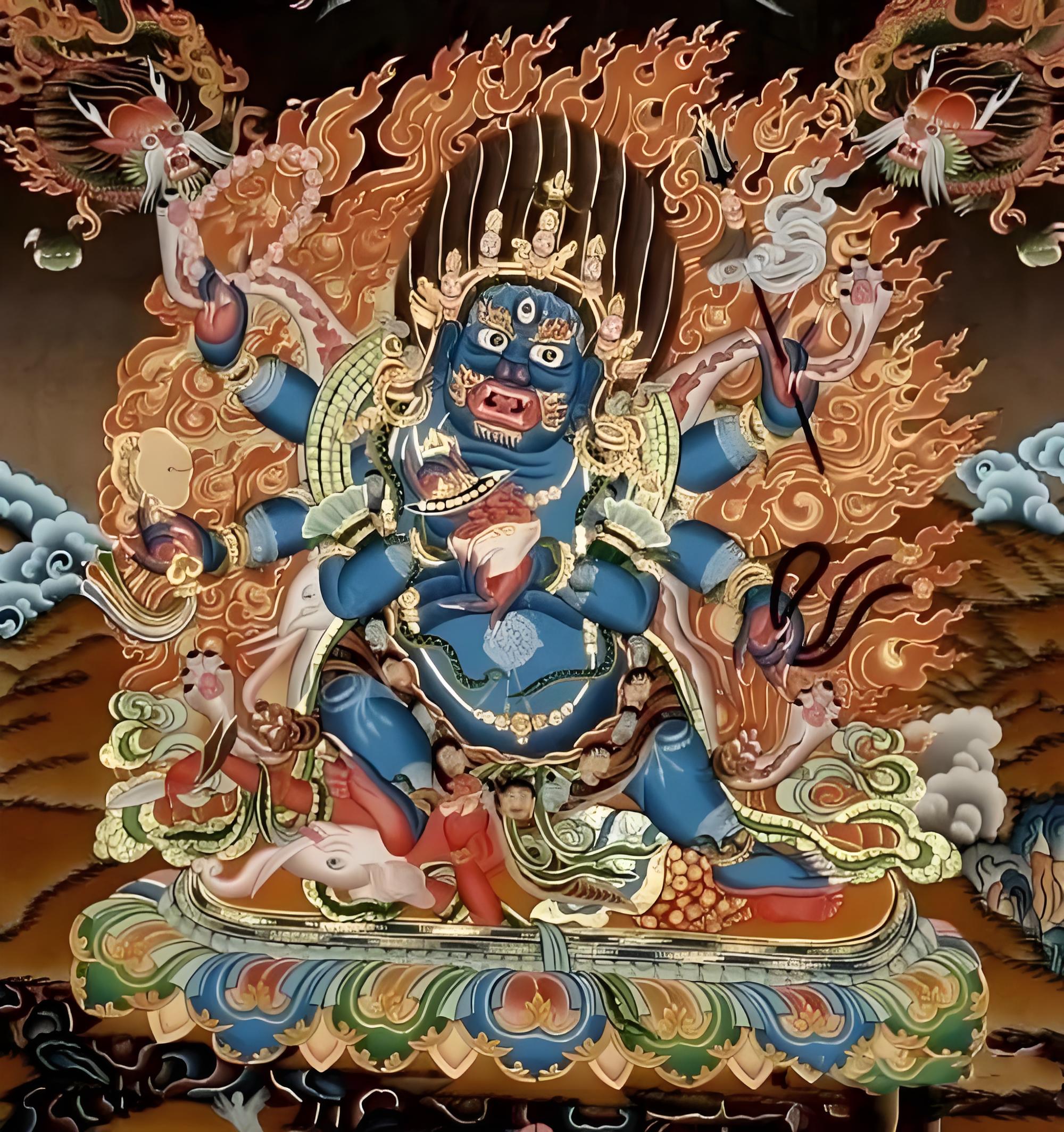
The second category originates from the treasure scriptures (during the early propagation period, Guru Rinpoche, Vimalamitra, King Trisong Detsen, Yeshe Tsogyal, Rulu Namkha Nyinpo, Vairotsana, and Rulu Sangye Yeshe and others successively concealed the tantric scriptures in mountains, rocks, and earth. During the later propagation period, people gradually unearthed these scriptures and propagated them, and these scriptures are called treasures). These scriptures are important to understanding the lineage of Dharma Protectors in some schools of Tibetan Buddhism.
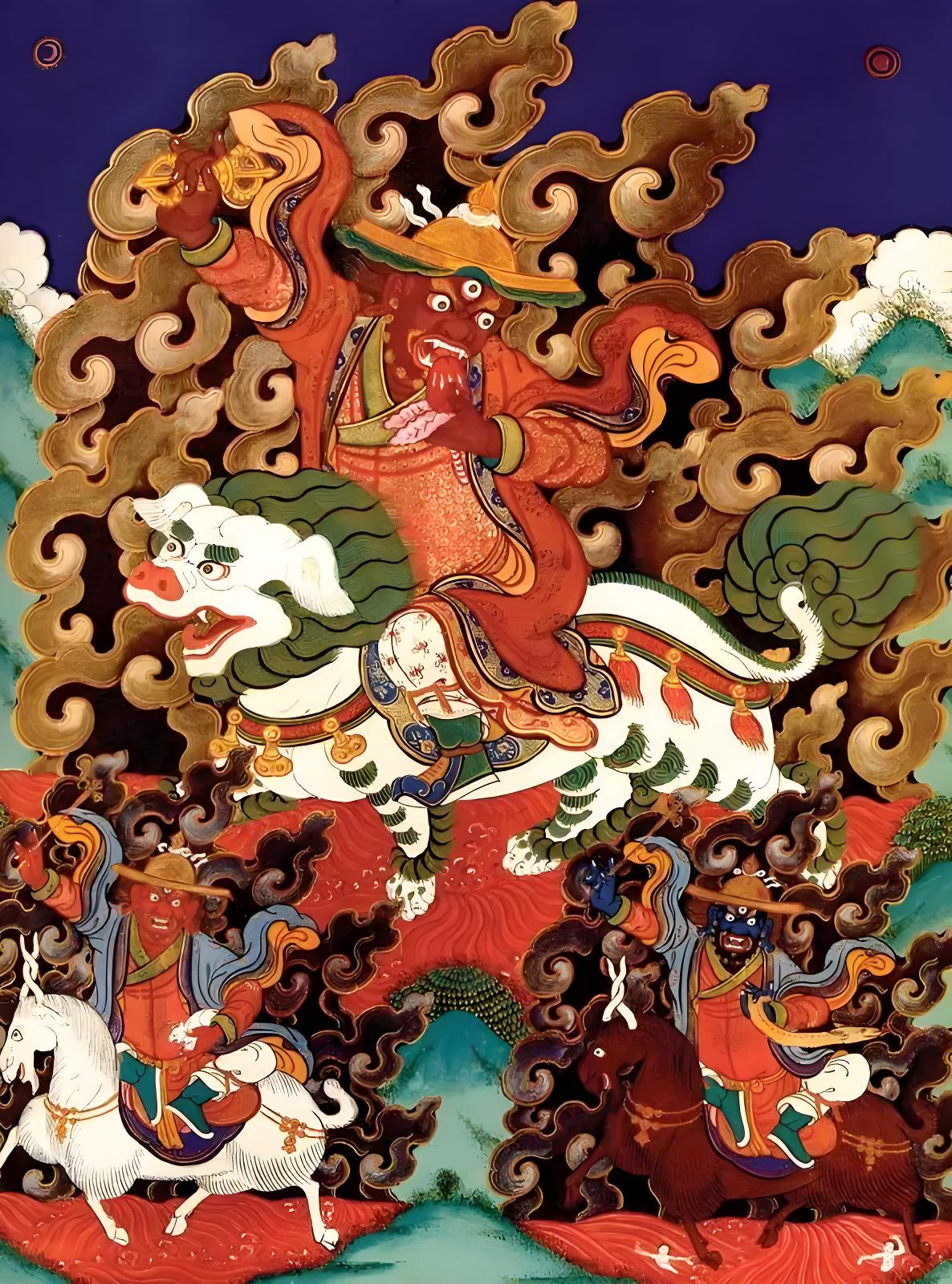
The third category comes from the original Bon religion. Before the eighth century, folk beliefs in Tibet included worldly deities such as water gods, fire gods, earth gods, star gods, regional gods, local gods, birth gods, war gods, wealth gods, auspicious gods, road gods, wind gods, stove gods, the five personal gods, male protectors, female protectors, and life protectors. These deities from folk beliefs or the Bon religion were also absorbed into Buddhism, which was later introduced, and transformed into the class of worldly Dharma Protectors in Buddhism.
The esoteric Buddhism that was introduced to Tibet in the eighth century is called the Old Tantra. In the Old Tantra system, all deities are divided into eight parts.
Among them:
The five transcendent parts are: the Body of Manjushri, the Speech of the Lotus, the Mind of Reality, the Merit of Ambrosia, and the Action of Vajrakilaya.
The three worldly parts are: the Matri, the Poison Mantra, and the Worldly Praise.
The names of the deities in each of the above parts have classical records from Sanskrit translations from India.
During this period, Guru Rinpoche also subdued and incorporated a group of Tibetan deities and ghosts as Buddhist Dharma Protectors. There are 25 such protectors recorded in the "Ba Xie" and "Royal Documents," and their names are as follows: Wood Bird King, Blue-Clothed Vajra-Holder, Talisman Room King, White Har King, Copper Hammer King, Staff-Holding Yaksha, Dragon King Ananda Urigaga, Sangha Muli, Conch-Crested White Brahma, Fire Wheel Yama, Dragon Skin Robe King, Dama Lo Sage, Ox-Headed Yaksha, Silk-Clothed Dakini, Head-Wrapping King, Sudhana Yaksha, Tangla Gangba Treasure, Treasure Vase Yaksha, Nine Earth Fiends, Shooting Star Yaksha, Iron-Mouth Yaksha, Twelve Danma Goddesses, Yala Xiangbo, Ma Zhao Shining Dragon God, and Black Oath-Keeping Yaksha.
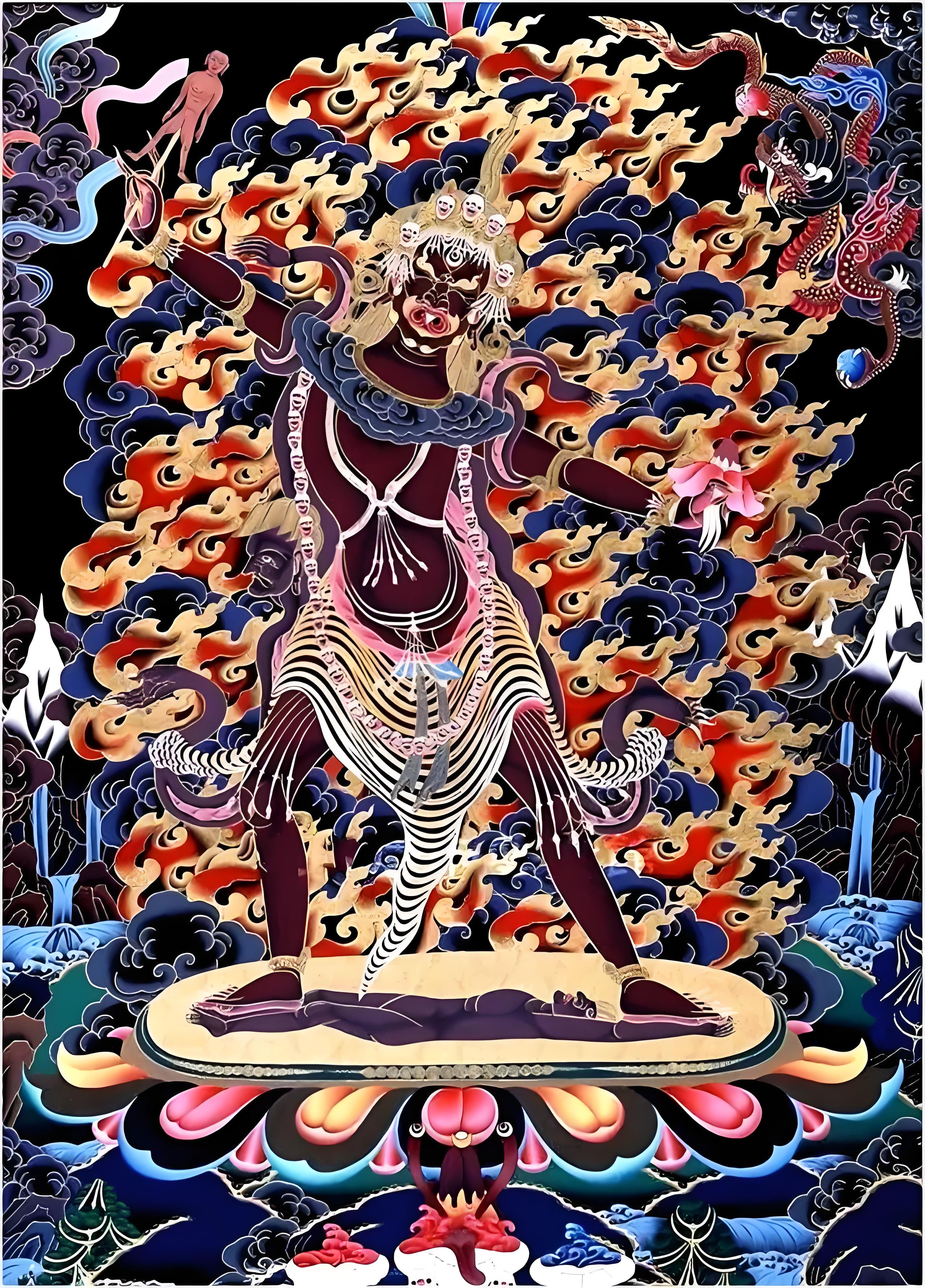
In the 12th century, the Dharma Protectors and practice rituals from the treasure scriptures unearthed by the treasure discoverers Nyinne Nyima Ozer and Guru Chowang were all collected in the book "The Treasury of Precious Things," compiled by Kongtrul Yonten Gyatso (1813-1899). The treasure scripture "Great Offering to All Deities" unearthed by the Vidyadhara Vulture Feather Venerable contains 21 deities of the entire Tibetan region. Their names are as follows: Damchen Dorje Lekpa, Nyenchen Tanglha, Shangpo Gangla, Yanzhok Yuntso Shummo, Machen Pomra, Ao Dai Gong Gye, Gongzong Dema Jun, Dorje Drakje, Gurakari, Rongzen Karba Gakbo, Zhadu Wangxu General, Dragon King Migong Gakbo, Jiaoqian Dongre, Weidai Meigu, Banjazan Zai, Tsomeng Jemao Five Sisters, Gair Niambao, Liqi, Neigung Niamai, Ao Dai Resong, and Yala Shampo.
The above-mentioned Tibetan deities all belong to the category of worldly Dharma Protectors.
The difference between worldly and transcendent Dharma Protectors is:
Transcendent Dharma Protectors are above the level of the Path of Seeing and belong to the Sangha Jewel among the Three Jewels. They are the objects of refuge for Buddhist disciples, while worldly Dharma Protectors are below the level of the Path of Seeing and do not belong to the Three Jewels. They cannot be objects of refuge for Buddhist disciples.
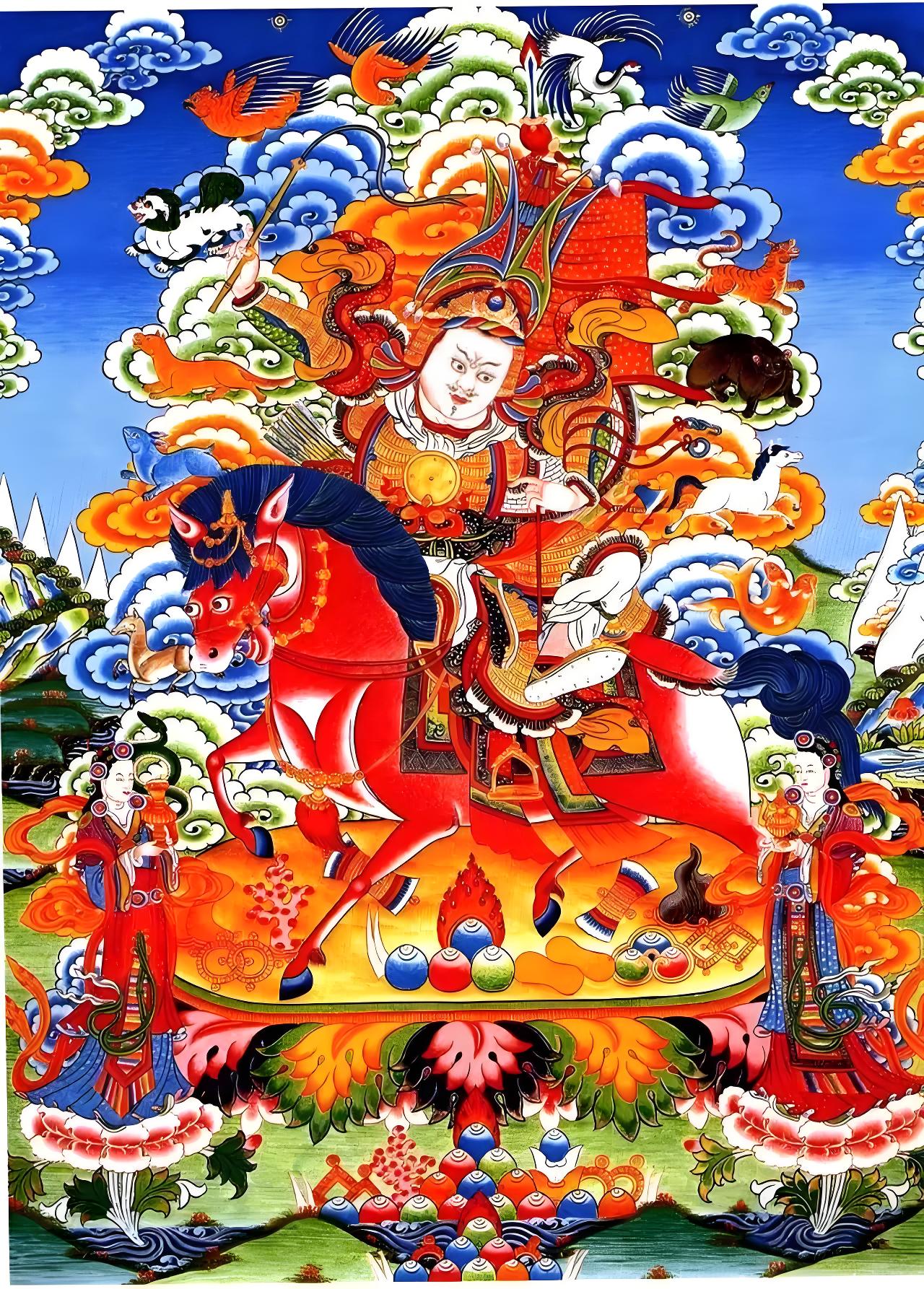
Due to the reasons of lineage transmission, the Bon religion and various schools of Buddhism in Tibet have their own Dharma Protector systems. For example: The teachings of the various types of Dharma Protectors are very diverse.
The Nyingma school takes Ekajati, Rahula, and Damchen Dorje Lekpa as its main protectors; the Dharma Protectors Nyingma School emphasizes these protectors.
The Sakya school takes the Eight Siblings of the Tent Protector, the Four-Faced Protector, and the Couple of the Wealth-Protecting Cemetery Lord as its main protectors; The Dharma Protectors Sakya School focuses on these deities.
The Kagyu school takes the Four-Faced Protector, the Black-Cloaked Protector, and the Five Long-Life Goddesses as its main protectors; The Dharma Protectors Kagyu School is known for these.
The Gelug school takes the Six-Armed Protector, Yama Dharma King, Vaishravana, and Palden Lhamo as its main protectors. The Dharma Protectors Gelug School prioritizes these.
Through the introduction of Buddhist scriptures and the transformation and absorption of deities in Tibetan folk beliefs, the above two categories of Dharma Protector systems, transcendent and worldly, in Tibetan Buddhism were all finalized between the eighth and tenth centuries.
Dharma Protectors of the Three Levels of Practitioners
The Dharma Protectors of the three levels of practitioners are broadly classified, with the Swift-Acting Protector, Vaishravana, and Yama as the three main "chiefs." This system outlines a specific method of practice.
- Swift-Acting Protector: The Swift-Acting Protector is said to be very effective. As soon as one chants or has a thought, this Dharma Protector immediately manifests its power. The Swift-Acting Protector is the Six-Armed Protector, who is a manifestation of Avalokiteśvara, the lord of all Dharma Protectors, and the protector of the highest level of practitioners.
- Vaishravana: Vaishravana is the "Northern Heavenly King" among the Four Heavenly Kings. He is the "Wealth King" and the protector of the middle level of practitioners. He is a widely practiced Dharma Protector.
- Yama: Yama is the representative of the protectors of the lowest level of practitioners and is in charge of the good and evil of the human and heavenly realms. He usually appears in the form of a ghost king, and Yama judges good and evil. This Dharma Protector is especially relevant in discussions about karma.
About the "Three Levels of Practitioners"
In his correspondence with Huiyuan, Kumarajiva quoted scriptures to discuss that the Buddha spoke of impermanence, suffering, and emptiness for beings of dull faculties; for beings of medium faculties, he spoke of no-self and the tranquil nirvana; and for beings of sharp faculties, he spoke of all phenomena being unborn and unceasing, and ultimately empty. The Buddha, in accordance with the understanding of sentient beings, explained the one meaning in three ways.
Atisha, the founder of the later propagation period of Tibetan Buddhism, wrote the famous "Lamp for the Path to Enlightenment," which emphasized the "Stages of the Path to Enlightenment": This describes the path of Buddhist practice.
The aspiration of the lower level practitioner is to be free from suffering for oneself.
The aspiration of the middle level practitioner is to seek nirvana for oneself.
The aspiration of the higher level practitioner is to empathize with the suffering of others from their own suffering and to remove the suffering of all beings out of altruistic motivation.
Dharma Protectors of Temples
If we receive precepts, we gain great merit. Therefore, we know that a temple, the platform for the Three Jewels to liberate sentient beings, has even more inconceivable merit.
There is a saying in Buddhism that as long as a brick or a tile remains in a temple, there will be Dharma Protectors there. Therefore, it is generally known that restoring an old temple has greater merit than building a new one. Building a new temple requires opening up the ground and inviting Dharma Protectors, while for old temples, as long as someone goes to restore them, the Dharma Protectors who have always guarded them will be very happy and will do everything possible to help you achieve your good wishes. This highlights how Dharma Protectors in temples offer protection.
Temples and the Three Jewels are the objects of practice that Buddhas and Bodhisattvas provide for us. We must always be respectful wherever we are. If we are disrespectful, we incur faults. Although the Buddhas and Bodhisattvas are compassionate, the Dharma Protectors have clear-cut stances.
Practicing According to the Dharma
After learning Buddhism, if everyone practices in accordance with the Dharma, your personal and family aura will change. When the aura changes, the Dharma Protectors and benevolent deities will gather around you, and you will naturally have a sense of integrity. This is one way of understanding how Dharma Protectors help followers.
This positive energy, in turn, will increase the power of the Dharma Protectors to dispel evil and punish evildoers.
Therefore, to summarize:
On the one hand, when we cultivate morality, concentration, and wisdom, we will have Dharma Protectors closely protecting us, and when we are diligent in practice, the power of the Dharma Protectors will also increase. This emphasizes the importance of how to gain Dharma Protector protection.
On the other hand, we must have respect for the Buddha, Dharma, and Sangha. Once we are lax or slanderous, our lives will lack the protection of positive energy Dharma Protectors and we will often miss the helping hand of the Buddhas and Bodhisattvas, and stray further down the path of samsara.
May the true Dharma abide forever,
May all virtuous masters spread the Dharma
Smoothly and perfectly,
May the country be prosperous and peaceful, and may epidemics be eliminated;
May all sentient beings have peace of mind and body,
May they be healthy and safe, and may their blessings and wisdom increase!
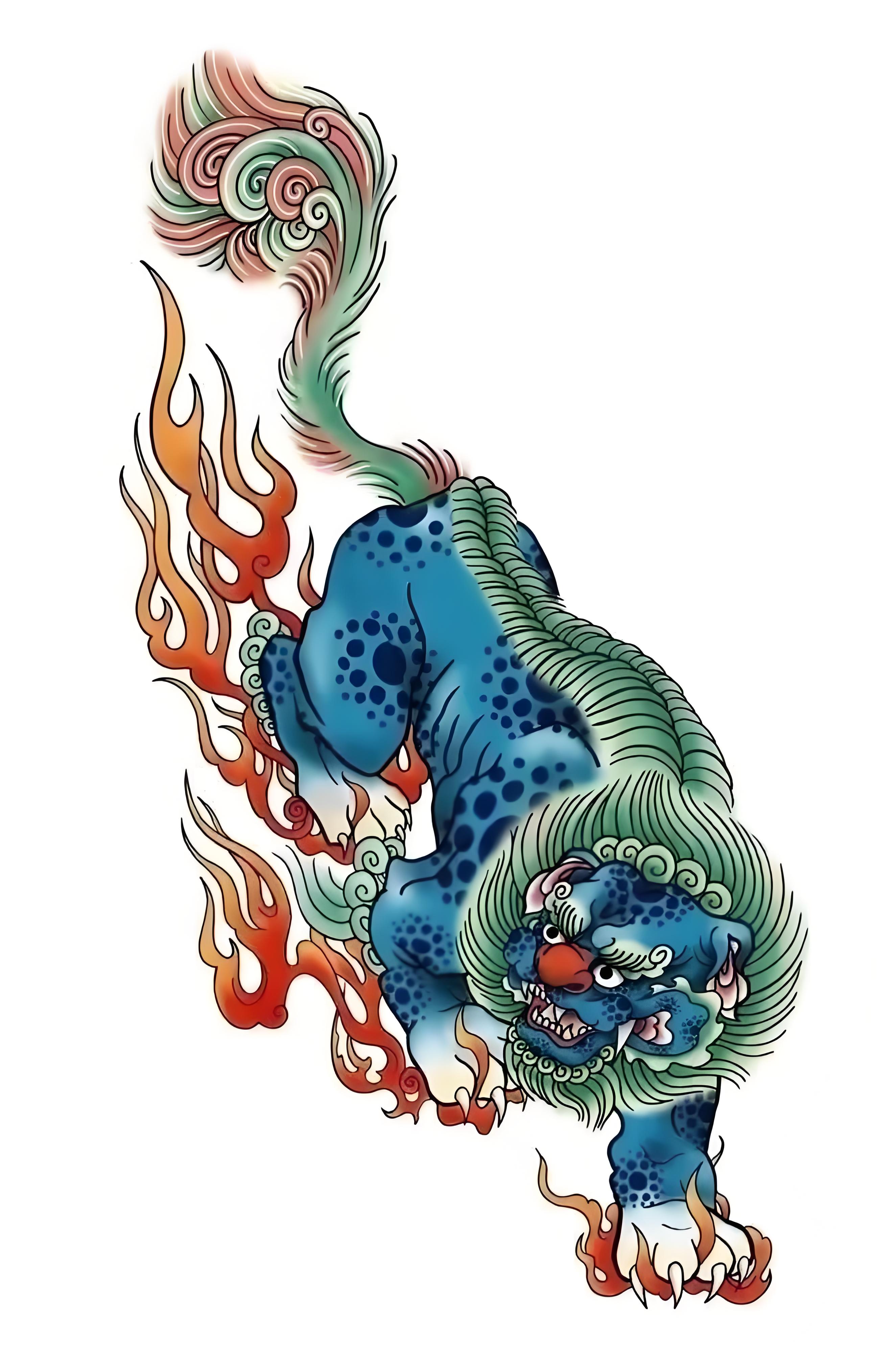
Several Stories of Dharma Protectors
1. A True Story Told by Venerable Master Meng Can
Venerable Master Meng Can once told a true story about a teacher in Beijing who could not use ritual instruments or perform rituals and had no followers but wanted to build a temple. What did he do? He prostrated to Ksitigarbha Bodhisattva every day for three years, and his karmic obstacles were removed, and he accumulated merit. Then, a local squire from Beijing saw how sincere this old monk was and decided to build a temple for him. It was quickly built. This is the power of Dharma Protectors!
There is an energy in the universe. If you have merit, you will naturally attract many virtuous friends to support you. They support you and also gain merit from you. Not only people support you, but also the eight classes of gods and dragons. When a Buddha appears in the world, thousands of Buddhas will support him.
The Agamas say that when a person is born, there are ghosts and deities accompanying him. However, the number varies. If it is a good person, there may be hundreds or even thousands of followers. If it is a bad person, there may be only one Dharma Protector for hundreds or thousands of people.
These ghosts and deities are like the bodyguards of a president today. Wherever you go, they will follow you.
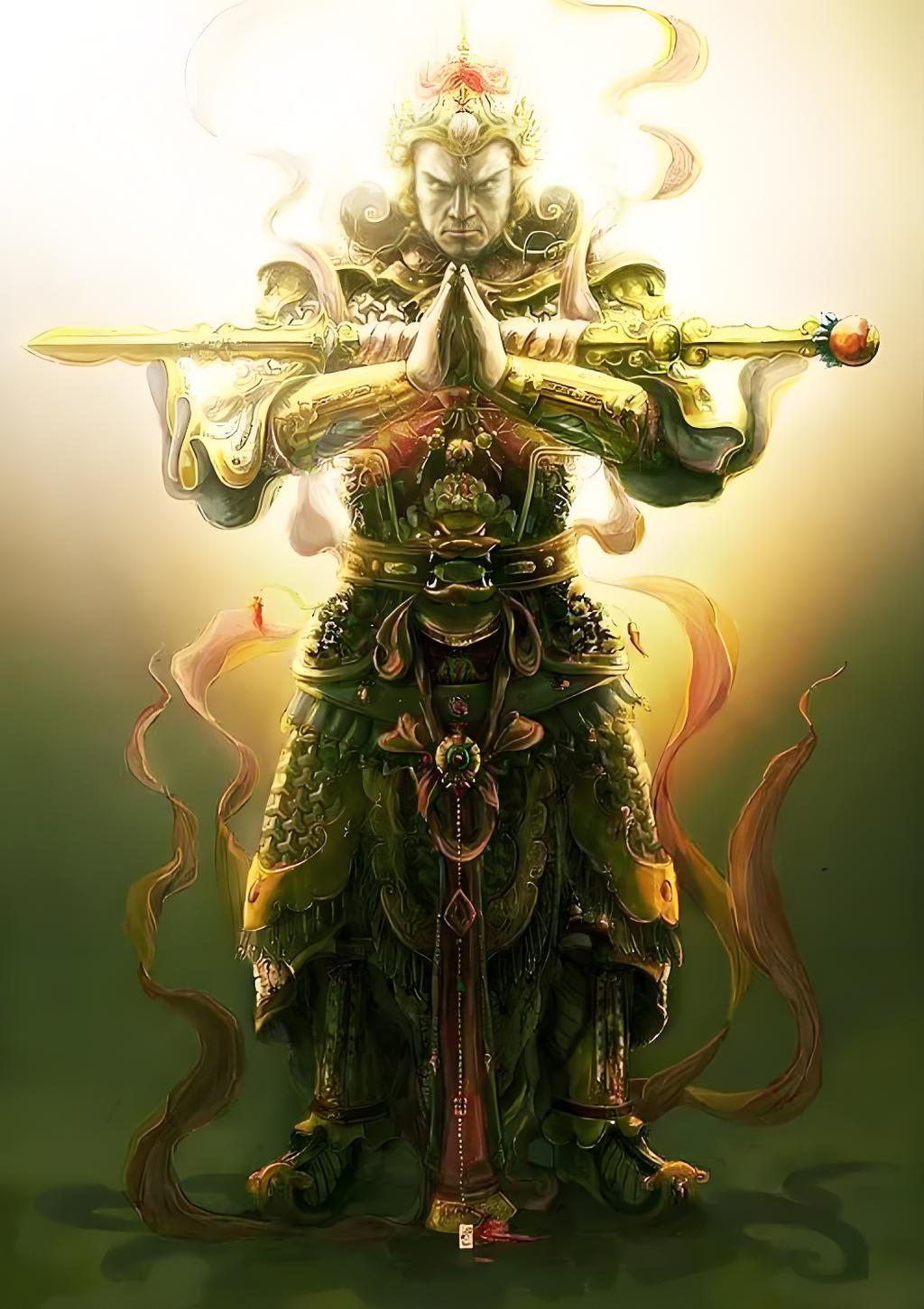
Buddhist scriptures say that for every precept one upholds, five Dharma Protectors are added. According to this, a person who upholds the five precepts will have at least twenty-five Dharma Protectors.
In addition, when you are chatting, Dharma Protectors are often around. If you are talking about useless things, the Dharma Protectors will leave one by one. If you are talking about the Dharma, the Dharma Protectors will listen. If it is well spoken, more and more Dharma Protectors will gather around.
It can be said that everyone's Dharma Protectors are always around. These deities have both protective and supervisory functions, and even punitive functions. This touches upon Dharma Protector punishments. This is in accordance with the saying, "People are doing it, heaven is watching."
The Agamas in Buddhist scriptures mention that the deities of the Four Heavenly Kings come to the human world on the 8th, 14th, 15th, 23rd, 29th, and 30th days of each lunar month to observe. On the 8th and 23rd, the Heavenly Kings send their ministers to observe the good and evil in the human world. After the ministers observe, on the 14th and 29th, the Heavenly Kings send their princes down to observe. On the 15th and 30th, the Heavenly Kings themselves descend to observe. After the observation is completed, they report to Sakra, the heavenly king of Trayastrimsa heaven (the Jade Emperor in folk beliefs). In folk beliefs, this is called "delivering the decree."
Some Buddhists say that they are very afraid of ghosts. If you are afraid of ghosts, you will chant the Ksitigarbha Sutra, and the ghosts will be afraid of you. The ghosts will kowtow to you when they see you. You cannot see with your physical eyes, but when you chant Ksitigarbha Bodhisattva, or when you chant the three Ksitigarbha Sutras, how many Dharma Protectors will protect you? In the Ksitigarbha Sutra, the Solid Earth Deity does not protect other methods. He does not protect Manjushri, Samantabhadra, or Avalokiteśvara. He specifically protects Ksitigarbha, so he is called the Solid Solid Earth Deity. This also highlights how Dharma Protectors help.
If you have recited the Ksitigarbha Sutra, in the eleventh chapter, the Solid Earth Deity said that the entire land is filled with his descendants. Wherever there is land, there are his descendants, and his descendants are all protecting Ksitigarbha Bodhisattva. Therefore, deeply believe in the profound Dharma, that our own mind is the Buddha, and the mind becomes the Buddha. However, we have not opened our wisdom eyes, so we are not able to practice the genuine cultivation, and thus not able to open our wisdom eyes. Because you have not cultivated, how can you open your wisdom eyes? After cultivation, your Buddha statue should have its wisdom eyes opened. When you achieve realization, then you can open your wisdom eyes.
Among the Dharma Protectors, the gods and dragons are the main Dharma Protectors. Don't think, "Oh, I do a lot of good deeds, so it doesn't matter if I break the precepts." Don't hold this mentality. As mentioned earlier, it is meritorious to offer money, but if the money you offer is not clean, you will still have bad consequences. Good fortune does not eliminate evil. If a Dharma Protector punishes you, it is also a form of compassion. You will then stop doing it. Otherwise, it will be difficult for you to stop. There was a person who sold fish. He only stopped after he became seriously ill. Otherwise, people always feel that they never have enough money. This is the karmic manifestation of sentient beings. This highlights the karmic consequences of actions and the role of Dharma Protectors.
2. Koan Story: The Dharma Protector Had No Choice But to Leave Crying
There was a very evil woman. After she died, she was almost never done a good deed in her life, the ghosts caught her and threw her into the fire sea of hell because her family had worshipped a Dharma Protector. The Dharma Protector, seeing that she was being hung in the fire sea, felt very sorry for her and hoped that he could help her. He wanted to find a good deed that this woman had done, so he could ask the Bodhisattva for help. After thinking about it, the Dharma Protector finally remembered, and he said to the Bodhisattva, "Bodhisattva, this devotee once found a rope in the vegetable garden and gave it to a female beggar."
The Bodhisattva said, "Okay, then you take this rope to the edge of the fire sea and extend it to her, let her grab the rope, and you can pull her up. If you can pull her up from the fire sea, I will let her go to heaven. If the rope breaks, the woman will have to stay in the fire sea, as she is now." The Dharma Protector hurriedly ran to the woman, extended a rope to her, and said, "Hey, grab it, and wait for me to pull you up!" At this time, the Dharma Protector began to carefully pull her. When she was almost pulled up, the other sinners in the fire sea also wanted to come up with her. The woman exposed her inferior nature, kicking them desperately and saying, "That's my rope, not yours!"
As soon as she said this, the rope broke, and the woman fell back into the fire sea. The Dharma Protector had no choice but to leave crying. The woman later realized that this rope could actually pull many people up. The Bodhisattva wanted to use this opportunity to test her again to see if she had any intention of repentance, but she still displayed her cruel nature. She failed the test.
Learn about Dharma Protectors: guardians in Tibetan Buddhism. Discover how they offer protection and guidance on the path to enlightenment.
This story tells us that when we live in the world, we cannot only care about ourselves and not care about others. When a critical moment comes, when a person is being tested, their true nature will be revealed. Many people are willing to help others when it does not concern themselves. But when it is related to them, they forget about others and only think about themselves. Such people actually have good intentions but cannot withstand the test. Therefore, evil intentions start at this point. They slowly become selfish, do not help others, and send themselves to hell. This story highlights the importance of a selfless approach to Buddhist practice.
Good deeds will be rewarded, and evil deeds will be punished. This is actually telling us that as long as we can help others, we will eventually receive help from others. This evil woman lost the opportunity to go to heaven because of her last lack of repentance and her evil thoughts. Therefore, in this human realm, we must have more selfless love. Good and evil are in a single thought. Therefore, a single thought can lead you to heaven, and a single thought can lead you to hell. Don't let yourself fall into hell. We must always do good and avoid evil. This is the path of Buddhist practice.
3. Deities Offering Alms
"Those who have the morality of precepts will move the deities, and the dragons, gods and ghosts will all respect them." The story of the Tang Dynasty lawyer Daoxuan can prove this, it is true, and there is a detailed record in history.
Lawyer Daoxuan was the founder of the Vinaya School. He practiced in Zhongnan Mountain in those days. He kept his precepts strictly and moved the deities to provide offerings. He ate one meal a day at noon, and the prince of Vaishravana would send a bowl of rice every day at noon. This is truly "moving the deities, dragons, gods and ghosts." The act of offering to Dharma Protectors is seen as beneficial.
At that time, Master Kuiji, the patriarch of the Faxiang School, was a student of Master Xuanzang and was also a remarkable figure. One day, Master Kuiji passed by Zhongnan Mountain and visited Lawyer Daoxuan. Lawyer Daoxuan was very happy to hear the news. Master Kuiji had excellent scholarship and was excellent at lecturing, but his precepts were not strict. He thought that Master Kuiji was careless about the precepts and did not pay much attention to them, so he wanted to use the deities' offerings to influence Master Kuiji. How could he have known that when the talk went past noon, no one brought them food.
At noon the next day, the deities came again on time to bring offerings. Lawyer Daoxuan then asked, "Why didn't you bring offerings at noon yesterday?" The deity said, "Yesterday, there was a Mahayana Bodhisattva on the mountain. The mountain was full of Dharma Protectors, and I could not enter."
Lawyer Daoxuan broke out in a cold sweat when he heard this. He felt ashamed and knew that he was wrong. He underestimated others and overestimated himself.
4. The Departure of Dharma Protectors
In the past, there was a person who studied Buddhism. At first, he was very diligent. After taking refuge in the Three Jewels and receiving the five precepts, he also received the Bodhisattva precepts. However, later, he gradually degenerated. He broke the five precepts one by one, and the Bodhisattva precepts were also broken. However, there was one rule that he always kept, which was not to speak while eating.
As a result, one day, when he was about to sit down to eat, someone pulled the chair away, and he fell to the ground. He blurted out, "Oh my god!" When he spoke, the Dharma Protector was very happy. He appeared and said, "You have finally spoken while eating. I can finally leave you!"
This person did not understand, and he hurriedly asked the reason. The Dharma Protector replied, "At first, when you studied Buddhism diligently, there were many Dharma Protectors. However, as you gradually broke the precepts, the Dharma Protectors gradually left. In the end, when all the precepts were broken, all the Dharma Protectors had left, and there was no fragrance of precepts left. Once the Dharma Protectors left, all that surrounded you were hungry ghosts and evil karma. It was so foul-smelling. However, because you kept the rule of not speaking while eating, I had no choice but to stay and protect you. Now that you have finally spoken, I can leave. Thank you so much!"
When this person heard this, he was immediately ashamed and quickly repented. After repenting, he took the precepts again, and was restored to his original purity, and the Dharma Protectors returned. This story highlights that the importance of upholding Buddhist precepts and how that is linked to the presence of Dharma Protectors.
This story also tells us just how great the merit of taking precepts is.
5. The True Story of Ghost and Spirit Protection Experienced by the Great Monk Venerable Master Hsu Yun
In the spring of the 34th year of the Republic of China (1945), Venerable Master Hsu Yun went from Yunmen to Nanhua to transmit the precepts. This shows the importance of upholding precepts.
At this time, there were two monks in Yunmen Zen Monastery, one named Gugen and the other named Chuanzhen. They lived in the same dormitory.
One morning, the morning bell rang, but neither of them had gotten out of bed. After a while, Chuanzhen asked Gugen, "The bell has rung. Are we going to get up to recite the scriptures?"
Gugen said, "I'm not feeling well. You go ahead!"
Chuanzhen stretched, saying, "Ah! I'm too lazy to go. Let's be lazy for a while since the abbot is not here."
The two continued to sleep. After a while, the door that had been bolted last night suddenly opened with a "creak," and a cold wind rushed in, followed by a dark shadow. The two opened their sleepy eyes and saw a ghost with a head bigger than its body, palms bigger than its head, round eyes, wrinkles all over its face, long hair dragging on the ground, and long teeth protruding out. This story shows how the spirits can be present with Dharma Protectors.
The ghost stretched out its hand and dragged Chuanzhen from the bed, threw him to the ground with a "thud," and scolded him, "The Bodhisattvas open a practice place to help you cultivate, but you don't go to the hall to recite the scriptures. You have no shame. You should be beaten!" As he said this, he raised his huge palm and struck Chuanzhen's buttocks a dozen times with loud "smack, smack, smack..." sounds.
Upon seeing this, Gugen in the same room exclaimed, "Help! A ghost is beating someone. Help!" While shouting, he banged the bed board with a stool, making a loud noise. The ghost floated away.
When the monks in the monastery heard someone shouting for help, they ran over with wooden sticks. Gugen was pale with fear. Chuanzhen was lying on the ground, gasping for breath, trembling all over, and unable to speak.
Everyone carried Chuanzhen to the bed. When they pulled down his pants and shone a lamp on his buttocks, it was all bruised and swollen. They applied medicine and it took more than a month to heal.
That day, Gugen and Chuanzhen moved out and dared not stay in that room again.
The next night, a middle-aged monk named Daoming, who was a former soldier and had martial arts skills, volunteered to say, "Don't worry! I'll go and sleep there." He took a thick iron bar and went to sleep on Chuanzhen's bed.
In the middle of the night, the bolted door opened again with a "creak," and a cold wind came again, followed by the dark shadow.
Daoming was startled awake and tried to grab the iron bar that was placed by his pillow to fight the ghost, but his whole body was tied up and he could not move. The ghost said, "You have bad intentions. As a Buddhist disciple, you should get rid of your combative habits. I will not hit you now. If you do not repent, I will punish you again!" After the ghost left, Daoming regained his strength and rushed out, yelling, "Help! Help! The ghost is here again..." This shows how ghost and spirit protection in Buddhism works.
When the monks heard the news, they came to help with wooden sticks. Daoming was so frightened that he was paralyzed and leaned against the wall in the corridor. Everyone carried Daoming back to his room, and they boiled some brown sugar ginger soup for him to drink. He slowly recovered and told everyone in a rambling way what had happened when he encountered the ghost. Daoming rested for several days before he recovered his strength.
In April, Venerable Master Hsu Yun returned from Nanhua Monastery, and everyone told him about the ghost. No one dared to live in that room.
Late at night, while Venerable Master Hsu Yun was meditating, he saw an old man in a blue robe and white clothes come before him. He respectfully said, "This disciple lives in the back mountain, and has lived here for hundreds of years. A while ago, when the master went to Nanhua to transmit the precepts, this disciple also happened to be out. The younger generation is not filial and has disturbed the community. I have already reprimanded them and now have come especially to apologize to the master." The Dharma Protectors have the job of overseeing the order of a monastery.
Venerable Master Hsu Yun said, "Since you have already manifested in a different form, let us live in peace with each other. Do not manifest any more to disturb the community." The old man thanked him and left, and from then on, this kind of thing never happened again.
上一篇
Dharma Meaning Spiritual: Understanding the Core of Zen Practice
下一篇
Deities in Tibetan Buddhism (12)
Loading...

